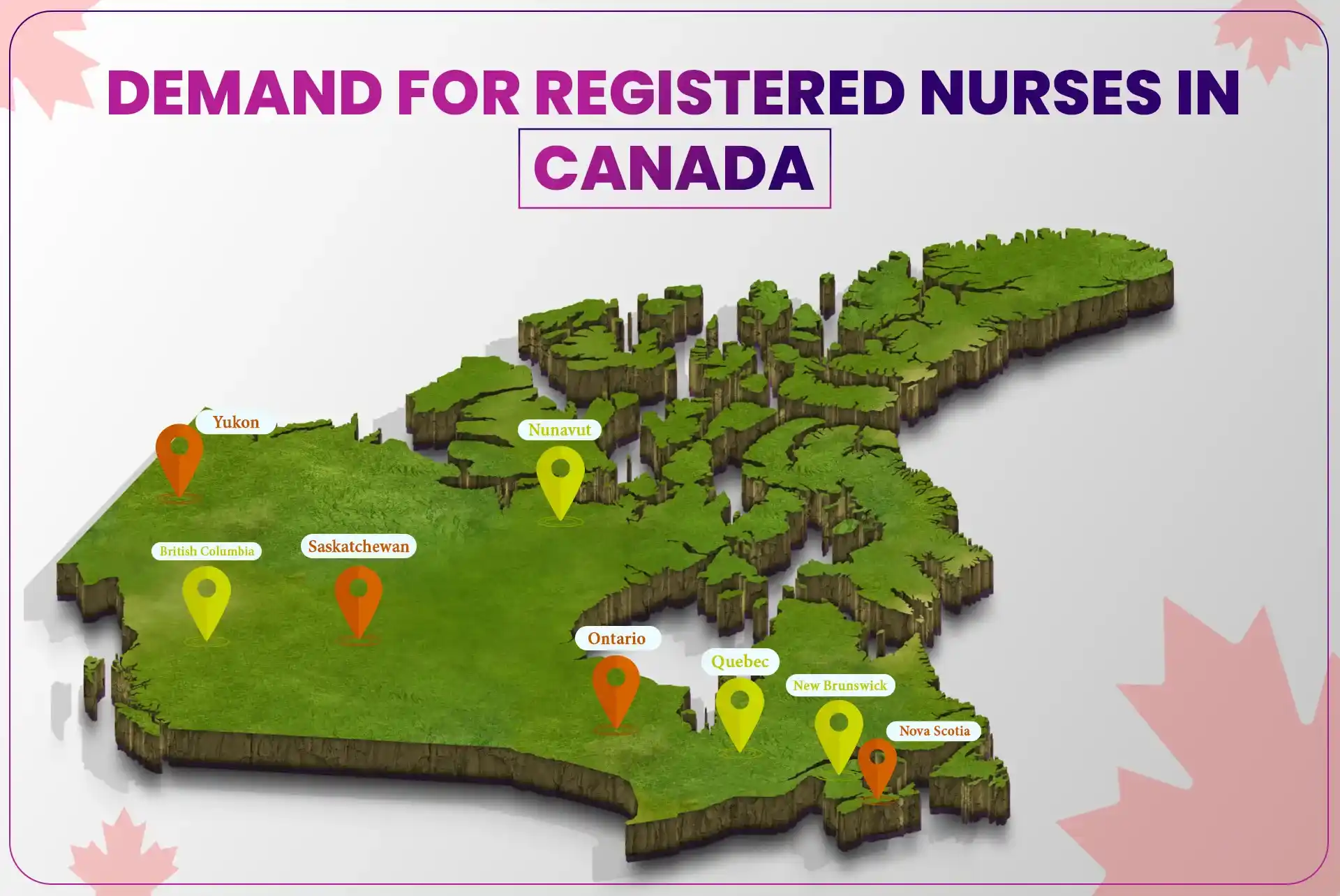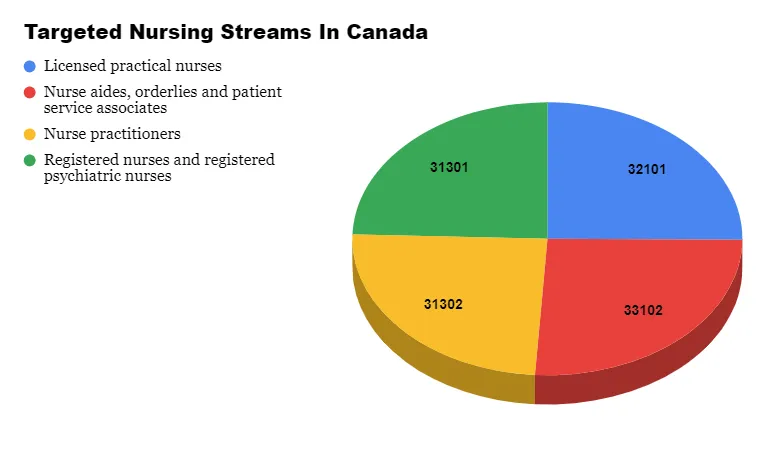Immigration Process for Nurses: Your Comprehensive Guide to a Rewarding Career in Canada
There are a lot of nursing professionals who dream of working in Canada. Nursing is a highly sought-after profession in the country because the healthcare system is globally recognized. Nurses who move to Canada need to navigate a structured immigration process, meet eligibility criteria, and ensure they are fully prepared for the journey ahead.
From determining your eligibility to understanding the best provinces for nurses, we’ll help you make your dream of working in Canada a reality in this guide.
Key Takeaways:
High Demand: With an aging population and advancements in healthcare, nurse demand in Canada is expected to grow significantly.
Professional Growth: Canada offers numerous opportunities for specialization in critical care, geriatrics, and pediatrics.
Supportive Environment: Nurses in Canada benefit from a supportive work environment, access to continuing education, and a strong professional network.
Why Choose Canada for Your Nursing Career?

In addition to a highly regarded standard of living and a leading healthcare system, the Canadian culture is renowned for its multiculturalism. The Canadian nursing profession is highly respected, well compensated, and offers a wide range of opportunities for professional growth.
Ontario Immigration Updates for Nurses
According to Ontario Regulation 422/17 (General), the government places a greater emphasis on nurses meeting the following two criteria than on educational requirements.
Ontario’s immigration streams have been updated to make it easier for qualified nurses to apply for permanent residency. The Human Capital Priorities (HCP) and French-speaking Skilled Worker (FSSW) streams are designed to attract skilled professionals who meet labor market needs.
What You Need to Know:
Registration with the College of Nurses of Ontario (CNO): Nurses must be registered with the CNO to be eligible for these streams.
NOC Codes: Your occupation should fall under one of the following National Occupational Classification (NOC) codes: 31300, 31301, 31302, or 32101.
Step-by-Step Guide to Immigrating to Canada as a Nurse
There are several key steps you need to take before embarking on your Canadian nursing journey. Here’s a detailed breakdown to guide you through the process:.
1. Research and assess eligibility
The first step is to determine whether your qualifications meet Canadian standards. This involves identifying your National Occupational Classification (NOC) code, typically NOC 3012 for registered nurses.
Eligibility assessment:
Federal Skilled Worker Program (FSWP): Check to see if you meet the criteria for this program, which is a common pathway for nurses.
Provincial Nominee Program (PNP): Some provinces have specific streams for healthcare professionals.
2. Language proficiency
The ability to speak English or French is crucial. To demonstrate their language proficiency, candidates will need to take a recognized language test, such as IELTS.
Required scores:
IELTS: A score of CLB 7 (Canadian Language Benchmark) or higher is generally required for Express Entry.
3. Education and Credential Assessment
Your nursing education needs to be assessed by an accredited Canadian organization. This process ensures your qualifications meet Canadian standards.
Key Agencies:
World Education Services (WES).
International Qualifications Assessment Service (IQAS).
4. Create an Express Entry Profile
If you’re eligible, creating an Express Entry profile is the next step. This online system ranks candidates based on factors like age, education, work experience, and language skills.
5. Receive an Invitation to Apply (ITA).
High-ranking candidates in the Express Entry pool may receive an Invitation to Apply (ITA) for permanent residency. This is a significant milestone in your immigration journey.
6. Submit the Required Documentation
Gather all the necessary documents, including educational certificates, work experience letters, police clearances, and medical exams, once you receive an ITA. It is crucial to submit your application on time to avoid delays.
7. Application Review and Visa Issuance
Canadian immigration authorities will review your application for accuracy and completeness. Upon approval, you’ll be issued a permanent resident visa, bringing you closer to your goal of working in Canada.
8. Licensing and Registration
After arriving in Canada, you’ll need a nursing license in your chosen province. Each province has its own regulatory body with specific requirements.
Example:
College of Nurses of Ontario (CNO).
British Columbia College of Nursing Professionals (BCCNP).
Best Provinces to Work as a Nurse in Canada

Certain provinces are particularly favorable for nurses, offering better job opportunities, competitive salaries, and a strong demand for healthcare professionals.
Top provinces:
British Columbia: Nurses can benefit from the BC Provincial Nominee Program, which adds 600 points to your Express Entry profile.
Saskatchewan: The International Health Worker Expression of Interest (EOI) pool is open to nurses with at least one year of work experience.
Nova Scotia: The Labour Market Priorities Stream targets experienced nurses, boosting your CRS score.
New Brunswick: The Internationally Educated Nurses (IEN) program is tailored for foreign nurses, offering a clear pathway to permanent residency.
IELTS Score Requirements for Nurses in Canada
To work as a nurse in Canada, you must meet the IELTS requirements. According to the table below, different language abilities require different scores.
| CLB Level | Speaking | Listening | Reading | Writing | Points |
|---|---|---|---|---|---|
| 7 | 6.0 | 6.0-7.0 | 6.0 | 6.0 | 4 |
| 8 | 6.5 | 7.5 | 6.5 | 6.5 | 5 |
| 9 | 7.0 | 8.0 | 7.0 | 7.0 | 6 |
| 10+ | 7.5-9.0 | 8.5-9.0 | 8.0-9.0 | 7.5-9.0 | 6 |
Frequently Asked Questions (FAQs).
1. Which province is best for studying nursing in Canada?
In provinces such as Ontario, British Columbia, Alberta, and Quebec, nursing programs offer comprehensive education and clinical experience. A program’s reputation, specialization options, and career goals will determine which province is best for you.
2. How can a foreign-trained nurse work in Canada?
Foreign-trained nurses can apply through Express Entry or Provincial Nominee Programs (PNPs). They must have their credentials assessed by an authorized Canadian organization and demonstrate language proficiency.
3. What is the salary range for nurses in Canada?
Nurse salaries in Canada vary by province and experience. Registered nurses earn between CAD 60,000 and CAD 100,000 annually, with higher salaries in urban areas and in specialized fields.
Conclusion
The process of immigrating to Canada as a nurse requires careful planning, meeting specific requirements, and understanding the nuances of the Canadian healthcare system. The right preparation can lead to a rewarding and successful career in one of the world’s most respected healthcare environments.
Consider consulting with immigration experts or visiting official Canadian government websites for more updated information on current requirements and opportunities.




